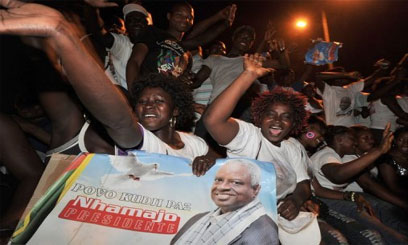
File picture shows supporters of Guinea Bissau presidential candidate Manuel Serifo Nhamadjo's at an election rally in March/ AFP
The country’s foreign minister meanwhile begged the UN Security Council to send an international force to help bring down the military junta that took power a week ago.
A joint statement by the opposition and military rulers named former parliamentary speaker and independent presidential candidate Manuel Serifo Nhamadjo to lead the interim government.
Opposition spokesman Vitor Perira said the choice had been made by “consensus”.
Nhamadjo, an ally of deceased president Malam Bacai Sanha who died after a long illness in January, broke away from the ruling party to run in an election after then-prime minister Carlos Gomes was chosen as its presidential candidate.
He placed third in a first round of voting with 15.75 percent.
Gomes was the leading candidate ahead of an April 29 run-off before the electoral process was aborted by the latest military coup in the chronically unstable west African nation.
After dissolving government and announcing the two-year transition period in a deal brokered with the opposition, the military rulers on Thursday re-opened the country’s borders, airport and sea port after the April 12 coup.
This deal excludes the former ruling party which has set up an anti-putsch front with nine smaller parties which are not represented in parliament.
The grouping denounced the “irresponsible, undemocratic attitude of certain politicians hiding behind the military to access power.”
It also demanded the immediate freedom of interim president Raimundo Pereira and Gomes, along with other top officials reported to be “in good health” by a Red Cross team which was able to visit them on Thursday.
As the junta strived to restore normalcy, the international community condemned its plan to remain in power and demanded a return to constitutional order.
Mamadu Saliu Djalo, the foreign minister who was away at the time of the April 12 coup and has been unable to return, told the Security Council, “I beg for action.”
He called for the deployment of an intervention force and was backed by Portugal and the main group of Portuguese-speaking nations.
The Portuguese-speaking group and the West African regional group are already discussing a possible force, diplomats said.
The World Bank and the African Development Bank suspended development programmes to the chronically unstable nation, saying they were “halting our development operations, with the exception of emergency assistance”.
West African states condemned the two-year transition deal as illegal and called for the immediate return of constitutional rule.
The Economic Community of West African States (ECOWAS) “strongly condemns this illegal initiative”, a statement said.
ECOWAS was to hold an emergency summit next week to discuss the situation in Guinea Bissau, it added.
With petrol running low and banks still closed, life has grown harder for the average person who had hoped efforts to end a cycle of instability would be strengthened through the aborted election.
Observers said the poll was credible but the opposition denounced widespread fraud and were threatening to boycott the run-off.
With the second round vote looming, soldiers, angry over Gomes’ growing reliance on a large contingent of Angolan troops, ousted his government.
The opposition deal with the junta created a National Transition Council to oversee the transition, which will be headed by Braima Sori Djalo of the main opposition Party for Social Renewal, said Pereira.
Junta spokesman Lieutenant Colonel Daba Na Walna told reporters that the former ruling African Party for the Independence of Guinea and Cape Verde (PAIGC) had been invited to take part in talks but had not come.
“It excluded itself,” he said.
PAIGC secretary general Luis Olivares said the party had not taken part because the agreement was “unconstitutional and undemocratic”.
“It’s a good agreement,” said Cirilo Rodrigues, head of the Socialist Party.
“We have succeeded in taking power from the soldiers and that is the most important.”








































